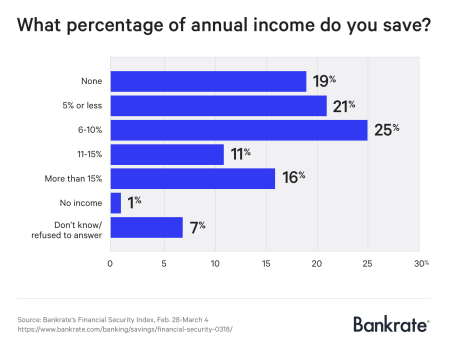Ask Chuck: How to save $1K on a limited income
To learn Biblical answers to your financial questions, you can #AskChuck @AskCrown your questions by clicking here. Questions used may be lightly edited for length or clarity.

Dear Chuck,
I’m trying to save an emergency fund of $1000, but I’m making very little progress. I get so discouraged when I mess up. Can you offer any encouragement and saving tips for someone with limited income and too many bills to pay?
No Safety Net
Dear No Safety Net,
Well, I am glad you asked. The lack of savings in America today is at crisis level. Almost 1 in 5 of us say we are not saving a dime. Look at the data from Bankrate.com.

Saving excuses and challenges abound. We live in a culture that has normalized debt and consumption. Interest rates, lower than the Great Depressions, encourage consumption and discourage saving. Stock and housing bubbles encourage purchases using equity, stock portfolio or retirement accounts. Some advisors even go so far as to recommend eliminating “cash drag” by being 100% invested.
The Pew Research Center reported in December that the U.S. has the world’s highest rate of children living in single-parent households among 130 countries and territories. Many of these households are struggling to make ends meet.
A Better Way – God’s Way
God tells us to become savers. This is not contrary to faith! He tells us two times in Proverbs to go to the ant in order to become wise. That tiny little creature with a tiny little brain sets the standard for saving. They don’t show up at your picnic to eat a meal. They dutifully haul away crumbs to save for the future.
Although we understand this, we often struggle when setbacks and problems occur. Instead of giving up, we need to see those challenges as opportunities to depend on God and rely on His strength. Surrendering our will to His enables us to live contrary to the world.
Sound financial decisions depend on adequate knowledge and the wisdom to apply it. “The fear of the Lord is the beginning of knowledge; fools despise wisdom and instruction.” (Proverbs 1:7 ESV) What God says must be our plumb line. Living by His financial principles requires a faithful heart and disciplined hands.
Become a Saver
First acknowledge that God is the Provider and surrender ownership of everything to Him. Then, pray over decisions and seek godly counsel from those who are living out sound principles. The sooner you start the faster you will progress.
Savers are Motivated
- To avoid debt and experience peace when emergencies arise
- To give regularly and when led to help others
- For funds to make better spending choices
- To survive a job loss or injury
- To avoid burdening others
- For freedom and flexibility
- To put money to work
Next, always, always…(did you hear me say, ALWAYS?) live on less than you earn; regardless of your income. Living beneath your means is foundational to saving. It must become a habit, and then a lifestyle, so you naturally delay gratification and resist temptations to spend. Humility, self-control, personal sacrifice and time are required. These are things that are not lauded in our culture today; but the culture is not who we are trying to imitate, right?
Next, build your emergency fund first, then your retirement and long-term accounts. Set a goal to save $50. Don’t spend it. Then another $50 and another $50. Be disciplined by saying no to what you want to find the little opportunities to get up to $1,000 in your emergency fund. When true emergencies arise, you will not have to depend on credit cards or withdraw (with penalties) from retirement accounts. Remember, a market correction can reduce retirement savings in minutes. So, a secure emergency fund is key to financial health.
If you have debt, develop the habit of saving something while making payments. Aim to pay off your loans, then apply that monthly repayment amount to your savings account. Resolve to pay any future credit card balance in full each month.
Lessons from Super Savers According to The Motley Fool
Super savers:
- Are lifetime learners
- Are masters of “forced scarcity”
- Minimize debt
- Set goals
- Find ways to make saving easier
“Super savers are making smart financial choices, but they aren’t sacrificing their quality of life,” says Jerry Patterson of Principal. “We make time for the things we find most important, and this group has prioritized savings and financial independence in a big way.”
You can cut a lot of small expenses or attack the biggies. Although both will make a difference, the big cuts will grant you margin fast. Housing, food, and cars are the categories that hinder savings for many.
Start with a spending plan or budget so you know where your money goes. Analyze your priorities and determine to always spend less than you earn. Did you hear me say, ALWAYS? Pray for self-control, a fruit of the Spirit, and exercise it!
A Few Tips to Remember
- Automate savings – treat as if not available unless real emergency
- Use extra income to save while paying down debt
- Break costly habits and addictions
- Collect and deposit loose change
- Plan menu and shop with a list to avoid eating out
- Use cash and coupons, find free entertainment
- Implement buy nothing weeks
- Want something? Wait 24 hours, pray, shop around
- Limit social media
- Drive older cars and live in a modest home
- Learn to make repairs and do things yourself
- Shop used, accept hand-me-downs
- Volunteer, help others, get eyes off self
- Develop an eternal perspective, focus on God
Regardless of your income, this will get you a safety net and allow you the financial margin to begin paying off your bills and experiencing financial freedom. A great way to get started is by using tools to help you learn great saving habits. The Eli app is a tool that helps automate your savings for you. Check out the new Eli app to develop the habit of saving as you work toward your goal. Thank you for writing.
Chuck Bentley is CEO of Crown Financial Ministries, the largest Christian financial ministry in the world, founded by the late Larry Burkett. He is the host of a daily radio broadcast, My MoneyLife, featured on more than 1,000 Christian Music and Talk stations in the U.S., and author of his most recent book, Money Problems, Marriage Solutions. Be sure to follow Crown on Facebook.






















